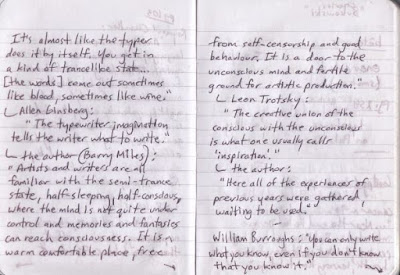These bits can be put down in text form, sketches, or both. Whatever works best for the notetaker at that stitch in time. Referring to a commonplace book and its contents weeks, months, or even years after the ink was set on paper, can be inspirational and instructive. "Oh, that's what spurred me on."
I'm good at making mental notes, but more often than not, if it's "not written down" when the bolt strikes, it eventually, at times too quickly, gets lost with the storm as it moves on.
If you read a lot, a commonplace book is a good companion; for writers, this book is essential, or at least it should be.
On February 16th, I filed the first part on my commonplace book entries on the late writer/poet, Charles Bukowski. As I stated in that piece, I'm a big CB fan (of his writings more than some of his behaviours).
In part two's scan, we see that I was on a roll entering truths and wisdoms about artists' creative processes and inspirations: notes from Bukowski, William Burroughs, Allen Ginsberg, Leon Trotsky, and Bukowski biographer Barry Miles. What does influence your sequencing of your keyboard's, or typewriter's, keys? What pushes your pen/pencil-equipped hand as it streams over the paper?... as if scripting around a Ouija board?
The unconscious mind is known to any creative artist. Where does it come from? (Well, this comes from my effort to complete something before my pasta finishes boiling....)


No comments:
Post a Comment